| Srl | Item |
| 1 |
ID:
099649


|
|
|
|
|
| Publication |
2010.
|
| Summary/Abstract |
With the first commitment period of the Kyoto Protocol expiring in 2012, time seems to be running out for a new successor agreement. The Protocol remains the most comprehensive attempt to negotiate binding limits on anthropogenic greenhouse gas (GHG) emissions. The long-term challenge, defined by the United Nations Framework Convention on Climate Change (UNFCCC), is to stabilise GHG concentration in the atmosphere at levels that would prevent interference with the climate system. There are, however, economic and social realities that drive anthropogenic GHG emissions. States face serious challenges of balancing economic growth on the one hand, and sustainability of natural resources and energy choices on the other. This dilemma has for long defined and continues to underline the climate change debate. This article chronicles the process of climate change negotiations and examines the political deadlocks through scientific uncertainties, lack of trust-building, inadequate leadership and political regrouping.
|
|
|
|
|
|
|
|
|
|
|
|
|
|
|
|
| 2 |
ID:
099650
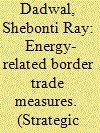

|
|
|
|
|
| Publication |
2010.
|
| Summary/Abstract |
Following the recent economic crisis, concerns over the revival of trade protectionism have surfaced, with some countries imposing or threatening to impose highly trade-distorting legislation to help their domestic industries compete in world markets, raising the spectre of a potential trade war. This paper looks at the attempts by some of the developed countries to introduce trade measures using the issue of climate change as a Trojan horse, to ensure that they do not lose out to the emerging economies. It also looks at the proposed legislations, and whether they are in conflict with international trade laws.
|
|
|
|
|
|
|
|
|
|
|
|
|
|
|
|
| 3 |
ID:
099647
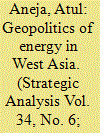

|
|
|
|
|
| Publication |
2010.
|
| Summary/Abstract |
The article analyses international politics surrounding the Iranian nuclear crisis, and its implications for stakeholders such as the United States and its western allies as well as for emerging market countries including India, China, and Turkey which are especially interested in Iran's energy resources. Given the existence of multiplicity of interests of these countries, often conflicting, the article analyses three possible scenarios of how the Iranian nuclear crisis is likely to be addressed. The first scenario examines the prospects of a peaceful resolution of the US-Iran tensions and examines its wider regional and international implications. Conversely, the second scenario considers the possibility of a war, led by the US and Israel against Iran. The third scenario analyses the possible emergence of Iran as a full-fledged nuclear weapon power. At the heart of the Iranian nuclear crisis is Tehran's ambition to be recognised by the global powers, especially the US, as an undisputed regional power. On the contrary, Israel, a premier US ally, stands vehemently opposed to Iran's drive to alter the status quo in a manner which undermines Israel's primacy as a leading military power in the region. Complementing the energy issues, an ongoing tussle between Iran and Israel is shaping the external international response to the Iranian crisis. The resolution of the Iranian nuclear issue, either peacefully, through military action or neither of the two ways, is likely to define the future pecking order in West Asia, and impact on a global power configuration that might emerge, principally involving the US, Russia and China, three members of the United Nations Security Council.
|
|
|
|
|
|
|
|
|
|
|
|
|
|
|
|
| 4 |
ID:
099644
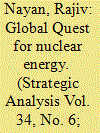

|
|
|
| 5 |
ID:
099646
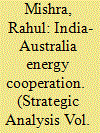

|
|
|
| 6 |
ID:
099642


|
|
|
| 7 |
ID:
099645


|
|
|
| 8 |
ID:
099653
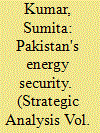

|
|
|
|
|
| Publication |
2010.
|
| Summary/Abstract |
Development prospects and economic growth in Pakistan, like in most other countries, will hinge on securing sustainable energy supplies. The Pakistan government has developed a strategy to enhance its energy production by 2030. This article explores the problems faced by the Pakistan government in optimising its use of indigenous energy resources and the implications that future plans to strengthen its energy security may have for its domestic and foreign policy.
|
|
|
|
|
|
|
|
|
|
|
|
|
|
|
|
| 9 |
ID:
099643


|
|
|
| 10 |
ID:
099652


|
|
|
|
|
| Publication |
2010.
|
| Summary/Abstract |
India has embarked on a policy to balance its need for accessing strategic energy resources from the African continent with Africa's aspirations for greater skills and sustainable development. Sudan has turned out to be the gateway for India's energy quest in Africa. India's age-old ties with Sudan have been crucial in accessing oil from the country. New Delhi's close relations helped to assuage the initial hiccups; however conflict between the Sudanese government and that of Southern Sudan have created some problems. Similarly, in Nigeria while India's strong diplomatic ties may have paved the way for the entry of India's oil companies, change in government and rising insecurity have dimmed future prospects. With growing investments, India needs to develop a long-term strategy to deal with these emerging security threats while continuing to maintain strong relations with countries on the continent.
|
|
|
|
|
|
|
|
|
|
|
|
|
|
|
|
| 11 |
ID:
099648
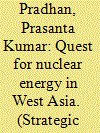

|
|
|
|
|
| Publication |
2010.
|
| Summary/Abstract |
Most of the countries in West Asia have expressed an interest in developing nuclear energy. For them their growing demand of electricity owing to the increasing population, growing industries, their eternal reliance on the desalinated water and environmental protection are the major drivers of their decision to produce nuclear energy. Importantly, they would like to use nuclear energy for domestic consumption and supply oil and gas to earn more revenues. But their decision has also raised suspicion in some quarters amidst the fears of militarisation of their nuclear programmes, which may lead to an arms race in the region. Nuclear programmes of the Gulf Cooperation Council (GCC) and Saudi Arabia have been termed as an effort to counter the Iranian nuclear programme. Similarly, Syrian and Egyptian nuclear programmes are suspected to be intended against Israel. There are also increasing safety and proliferation concerns as these countries still have not adhered to a number of relevant International Atomic Energy Agency (IAEA) documents.
|
|
|
|
|
|
|
|
|
|
|
|
|
|
|
|
| 12 |
ID:
099651


|
|
|
|
|
| Publication |
2010.
|
| Summary/Abstract |
The energy sector since the mid-2000s has acquired top priority in Russian state affairs, but since late 2008 it has also become the epicentre of the economic disaster that still continues to affect Russia. President Medvedev has effectively discarded the notion of Russia as an 'energy super-power' and is now focusing on 'modernisation' for Russia's development. But coherence of this course is problematic because the bulk of new investments must go into the energy sector in order to sustain the high revenues. The main flow of these revenues comes from Europe, but Gazprom's position in this market is now seriously undermined.
|
|
|
|
|
|
|
|
|
|
|
|
|
|
|
|
| 13 |
ID:
099641
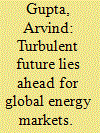

|
|
|